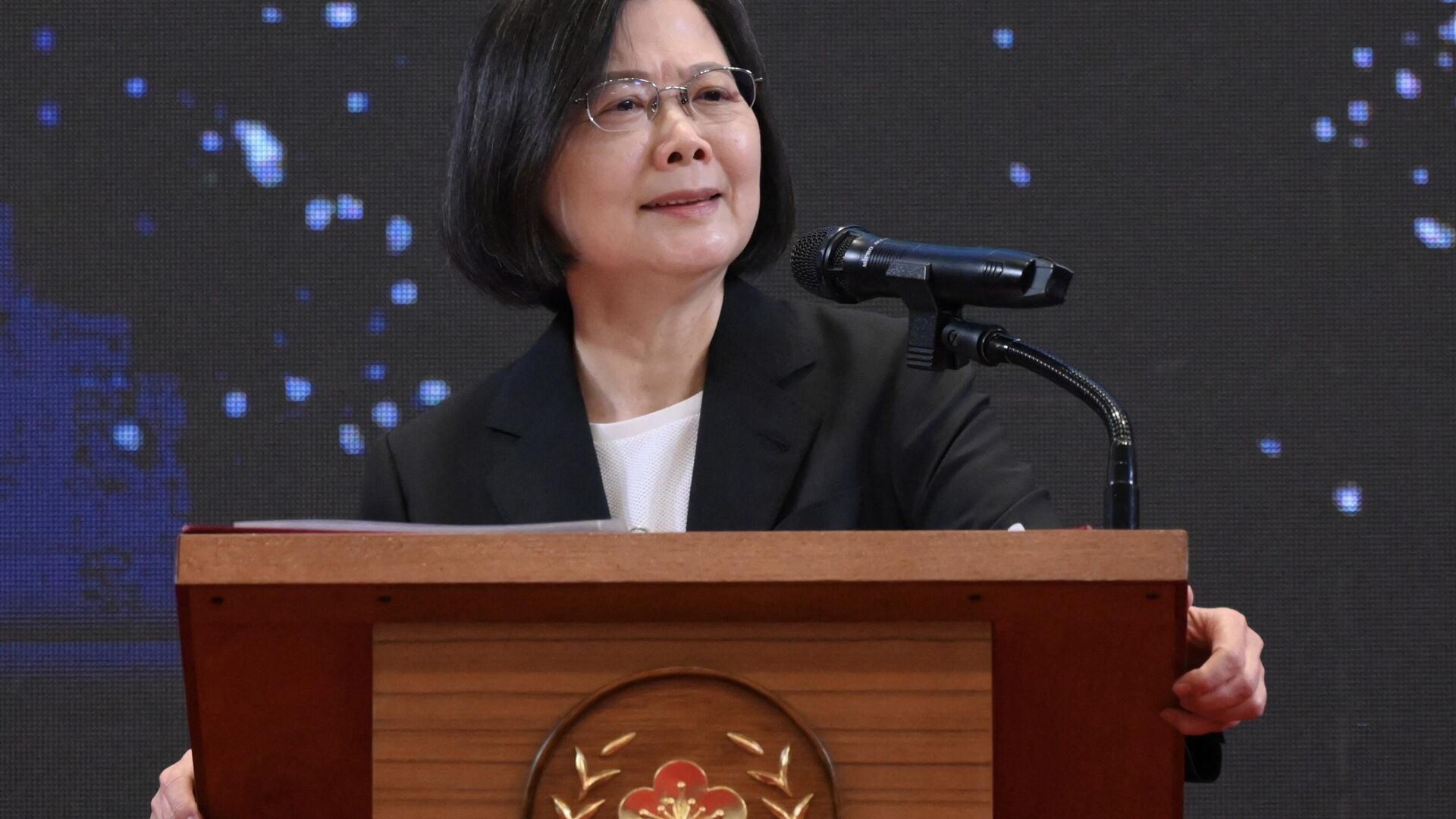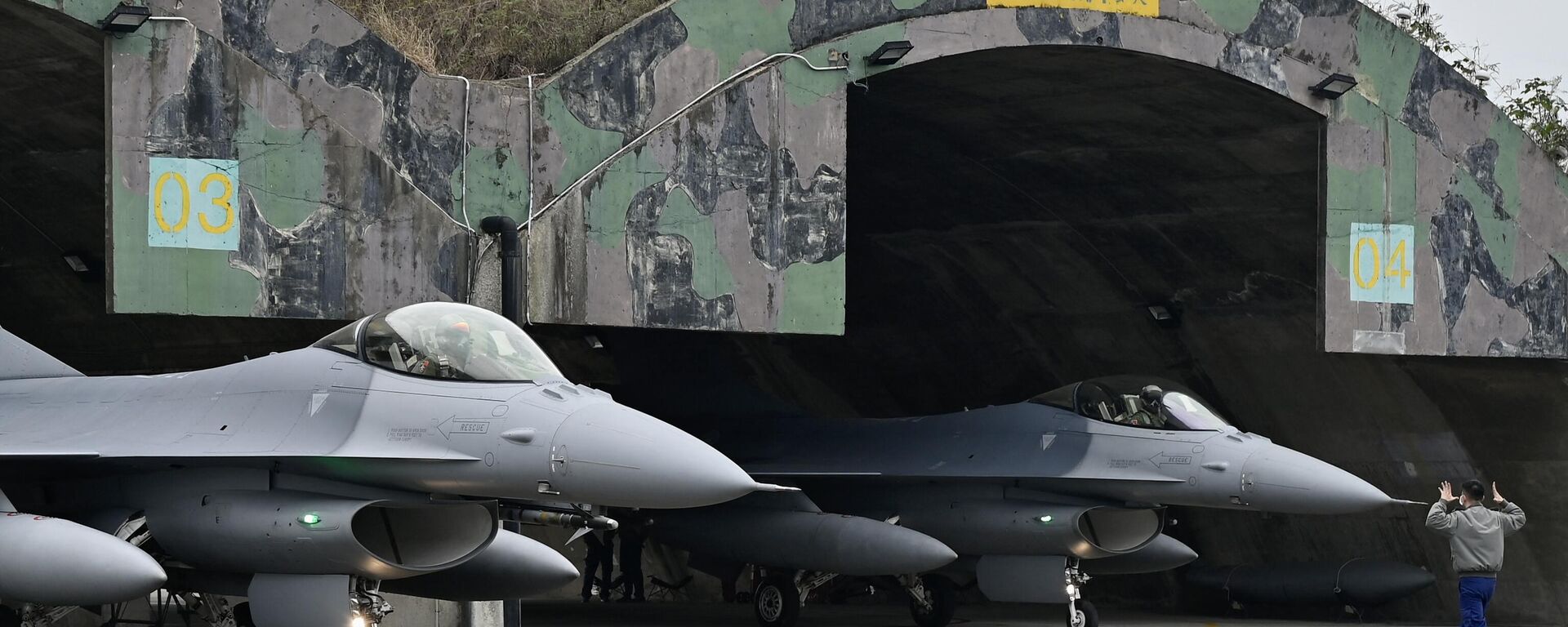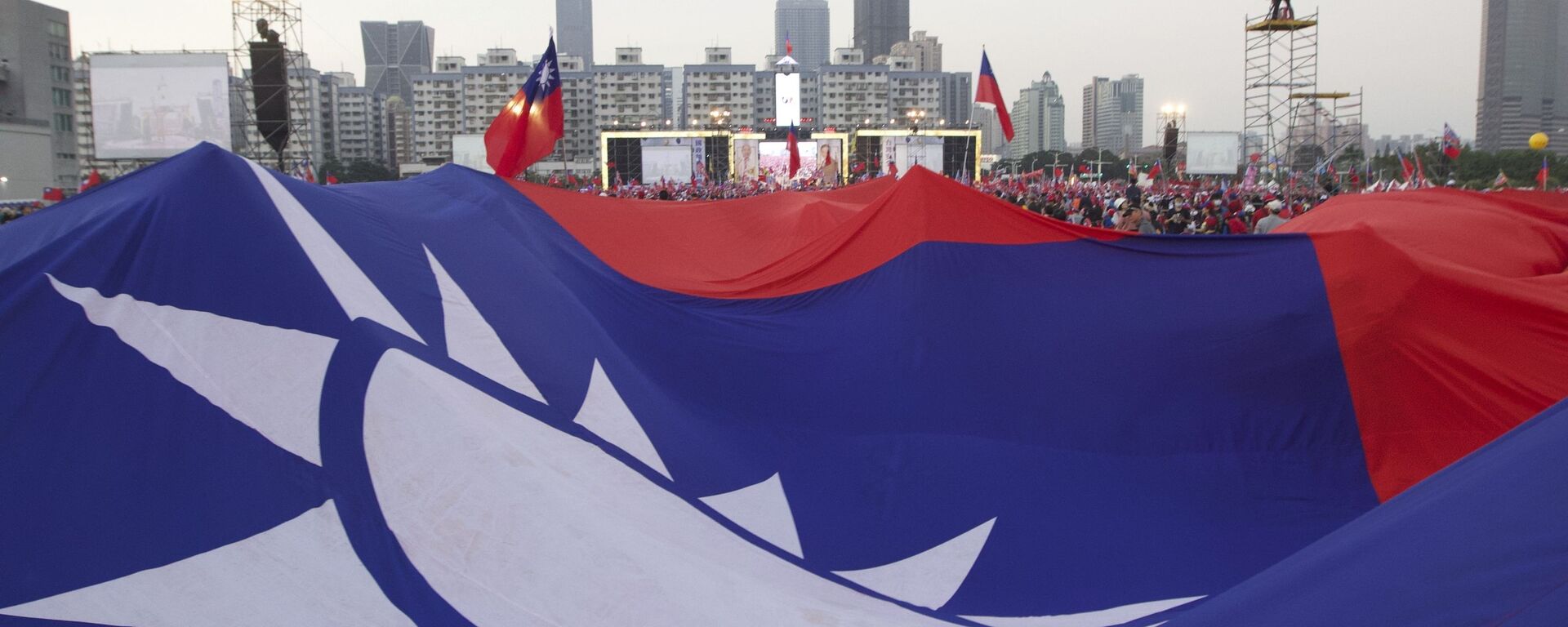https://sputnikglobe.com/20230520/taiwan-president-says-war-not-an-option-amid-china-tensions-while-angling-for-more-us-weapons-1110477100.html
Taiwan President: War 'Not an Option' As Tensions With China Grow While Angling for More US Weapons
Taiwan President: War 'Not an Option' As Tensions With China Grow While Angling for More US Weapons
Sputnik International
Taiwan's President Tsai Ing-wen spouted peaceful platitudes, vowing the island was intent on maintaining the “status quo” throughout the Taiwan Strait.
2023-05-20T06:14+0000
2023-05-20T06:14+0000
2023-06-19T12:46+0000
us
china
tsai ing-wen
joe biden
kuomintang
republic of china
asia
taiwan
https://cdn1.img.sputnikglobe.com/img/07e7/05/14/1110475781_0:160:3072:1888_1920x0_80_0_0_4d06967dd29d5390e352415f1783427b.jpg
As Washington continues to pump Taiwan with weapons while pushing the narrative of a looming Chinese “invasion”, Taiwan's President Tsai Ing-wen vowed she was determined to keep the peace and the island was intent on maintaining the “status quo” throughout the Taiwan Strait.The Taiwanese leader was giving a speech in Taipei on the occasion of the seventh anniversary since she took office – a period during which tensions between Washington and Beijing have irretrievably worsened.Ostensibly as part of this risk “defusing”, Taiwan officials are discussing receiving $500Mln of weapons aid from the administration of US President Joe Biden, as Tsai did not fail to mention. Earlier in May, there were reports that Washington was preparing another military package for the island, and to expedite the delivery, it intended to resort to the Presidential Drawdown Authority.Whether it is the continuous stream of US weapons to Taiwan, or the "historically significant” deal on the first part of the US-Taiwan Initiative on 21st Century Trade, just clinched, China and America remain at loggerheads over the island.Taiwan, which has been governed independently from mainland China since 1949, is viewed by Beijing as its province, but Taipei - a territory with its own elected government - considers itself an autonomous country but has stopped short of declaring independence. Tsai Ing-wen is gearing up to leave office next year after the presidential election in mid-January. Throughout her stint, which began in 2016, Washington has further expanded its clout in Taiwan. The People's Republic of China (PRC) has also vehemently opposed any official contacts between the island and other countries. In total disregard of China's warnings, the United States has been ramping up its informal diplomatic ties with Taipei in violation of commitments made when it restored diplomatic relations with Beijing in 1979. From the outset, Tsai Ing-wen adopted a strategy of provoking Beijing, with perceived encouragement from Washington. At the time, Donald Trump's administration deepened ties with Taiwan, and his successor, Joe Biden, has repeatedly pledged to protect the island militarily against Beijing.Although the US does not maintain formal diplomatic relations with Taiwan, it does have a representative office in Taipei and remains the island's biggest supplier of military hardware. When then-US House Speaker Nancy Pelosi visited the island in early August 2022, an incensed Beijing condemned the trip as a gesture of support for separatism, and held large-scale military exercises in the vicinity of the island in a retaliatory move. Since then, a succession of visits followed, including by US Congressman Michael McCaul, chairman of the US House Foreign Affairs Committee, who led a bipartisan delegation of US lawmakers to Taiwan, and was condemned by China for violating the One China principle, thus "sending a wrong signal to Taiwan independence separatist forces."The present flurry of weapons promised to the island comes ahead of the January 2024 presidential elections, which may potentially see a Kuomintang (KMT) comeback. Amid a slowing Taiwan economy, and after nine diplomatic allies of the island switched sides and turned to Beijing during Tsai's time in office, the KMT is trying to position itself as a force capable of ensuring stability and closer ties with China. Taipei City mayor Hou Yu-ih, who represents Taiwan's main opposition KMT party for the key vote, underscored during an election campaign event that the Republic of China (Taiwan's official name) faces a choice between "peace and war" under Tsai'. He pledged to bolster regional stability through "dialogue and exchanges," adding:
https://sputnikglobe.com/20230506/us-to-reportedly-fast-track-500-mln-arms-for-taiwan-amid-narrative-of-china-threat-1110137406.html
https://sputnikglobe.com/20230412/us-speed-up-of-arms-supplies-to-taiwan-prior-to-islands-2024-elections-sends-ominous-signal-1109390632.html
china
taiwan
Sputnik International
feedback@sputniknews.com
+74956456601
MIA „Rossiya Segodnya“
2023
News
en_EN
Sputnik International
feedback@sputniknews.com
+74956456601
MIA „Rossiya Segodnya“
Sputnik International
feedback@sputniknews.com
+74956456601
MIA „Rossiya Segodnya“
taiwan, us, taiwan's president tsai ing-wen, china, china threat narrative, status quo throughout the taiwan strait, $500 million worth of weapons, governed independently from mainland china, breakaway province, peaceful reunification, one china principle
taiwan, us, taiwan's president tsai ing-wen, china, china threat narrative, status quo throughout the taiwan strait, $500 million worth of weapons, governed independently from mainland china, breakaway province, peaceful reunification, one china principle
Taiwan President: War 'Not an Option' As Tensions With China Grow While Angling for More US Weapons
06:14 GMT 20.05.2023 (Updated: 12:46 GMT 19.06.2023) Taiwan has been witnessing escalating political divisions ahead of the elections on the island which are slated to take place on January 2024. Furthermore, Washington has been increasing military aid to Taiwan - viewed by Beijing as its province - justifying the move with the "threat" of China's "invasion."
As Washington continues
to pump Taiwan with weapons while pushing the narrative of a looming Chinese “invasion”, Taiwan's President Tsai Ing-wen vowed she was determined to keep the peace and the island was intent on maintaining the “status quo” throughout the Taiwan Strait.
“War is not an option. Neither side can unilaterally change the status quo with non-peaceful means. Maintaining the status quo of peace and stability is the consensus for both the world and Taiwan,” Tsai Ing-wen said on Saturday.
The Taiwanese leader was giving a speech in Taipei on the occasion of the seventh anniversary since she took office – a period during which tensions between Washington and Beijing have irretrievably worsened.
“Although Taiwan is surrounded by risks, it is by no means a risk maker. We are a responsible risk manager and Taiwan will stand together with democratic countries and communities around the world to jointly defuse the risks,” Tsai added.
Ostensibly as part of this risk “defusing”, Taiwan officials are discussing receiving $500Mln of weapons aid from the administration of US President Joe Biden, as Tsai did not fail to mention. Earlier in May, there were reports that Washington was preparing another military package for the island, and to expedite the delivery, it intended to resort to the Presidential Drawdown Authority.
Whether it is the continuous stream of US weapons to Taiwan, or the "historically significant” deal on the first part of the US-Taiwan Initiative on 21st Century Trade,
just clinched, China and America remain at loggerheads over the island.
Taiwan, which has been governed independently from mainland China since 1949, is viewed by Beijing as its province, but Taipei - a territory with its own elected government - considers itself an autonomous country but has stopped short of declaring independence. Tsai Ing-wen is gearing up to leave office next year after the presidential election in mid-January. Throughout her stint, which began in 2016, Washington has further expanded its clout in Taiwan. The People's Republic of China (PRC) has also vehemently opposed any official contacts between the island and other countries. In total disregard of China's warnings, the United States has been ramping up its informal diplomatic ties with Taipei in violation of commitments made when it restored diplomatic relations with Beijing in 1979. From the outset,
Tsai Ing-wen adopted a strategy of provoking Beijing, with perceived encouragement from Washington. At the time, Donald Trump's administration deepened ties with Taiwan, and his successor, Joe Biden, has repeatedly pledged to protect the island militarily against Beijing.
Although the US does not maintain formal
diplomatic relations with Taiwan, it does have a representative office in Taipei and remains the island's biggest supplier of military hardware. When
then-US House Speaker Nancy Pelosi visited the island in early August 2022, an incensed Beijing
condemned the trip as a gesture of support for separatism, and held large-scale military exercises in the vicinity of the island in a retaliatory move. Since then, a succession of visits followed, including by US Congressman Michael McCaul, chairman of the US House Foreign Affairs Committee, who led a bipartisan delegation of US lawmakers to Taiwan, and was condemned by China for violating
the One China principle, thus "
sending a wrong signal to Taiwan independence separatist forces."
The present
flurry of weapons promised to the island comes ahead of the January 2024 presidential elections, which may
potentially see a Kuomintang (KMT) comeback. Amid a slowing Taiwan economy, and after
nine diplomatic allies of the island switched sides and turned to Beijing during Tsai's time in office, the KMT is trying to position itself as a force capable of ensuring stability and closer ties with China. Taipei City mayor Hou Yu-ih, who represents Taiwan's main opposition KMT party for the key vote, underscored during an election campaign event that the Republic of China (Taiwan's official name) faces a choice between "peace and war" under Tsai'. He pledged to bolster regional stability through "dialogue and exchanges," adding:
"The fears for war will never drive away the hope for peace."




